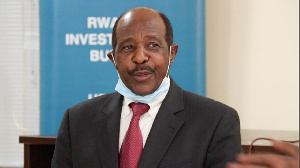Rwandan authorities have arrested Paul Rusesabagina, whose heroic actions during the 1994 Genocide against the Tutsi inspired the Hollywood movie Hotel Rwanda.
Mr Rusesabagina has been living in exile and is a leader of an opposition outfit accused of financing terrorism activities in Rwanda.
The announcement of his arrest on Monday came as a surprise and is shrouded in secrecy, with officials declining to provide details about it.
“For purposes of justice and investigation, we will not provide those details for now,” Thierry Murangira, the acting spokesperson of Rwanda Investigative Bureau (RIB), told The EastAfrican when asked about when or where he was arrested.
His arrest deals a significant blow to Rwandan rebel groups, and comes barely a year after military operations by Congolese forces in eastern Democratic Republic of Congo (DRC) left them weakened.
Mr Murangira told journalists in Kigali on Monday that Mr Rusesabagina, who lives in Belgium, had been arrested “through international cooperation” and was in the custody of RIB.
“Mr Rusesabagina is suspected to be the founder, leader, sponsor and member of violent, armed, extremist terror outfits including MRCD and PDR-Ihumure, operating out of various places in the region and abroad,” he added.
It remains unclear how Mr Rusesabagina, a citizen of Belgium, ended up on Rwandan soil.
The Belgian embassy told The EastAfrican that it had been notified about his arrest by the Rwandan government but that it had no involvement. The embassy further said Mr Rusesabagina had not been deported from Belgium.
In a grey suit, a red tie, and a face mask, Mr Rusesabagina was paraded before the media at the RIB headquarters in Kigali on Monday morning.
Photojournalists flanked him as he was ushered off a detainment van in handcuffs by armed policemen and taken to a conference hall where reporters were waiting.
“He is currently detained at Remera Police Station while his case file is being processed in accordance with Rwandan criminal procedure,” Mr Murangira told the press.
Kagame critic
Mr Rusesabagina was propelled into the international limelight in 2004 by Hollywood movie Hotel Rwanda, which details his heroic actions during the1994 Genocide against the Tutsi.
While living in Belgium and the US with his family, he formed the Rwandan Movement for Democratic Change (MRCD) in 2018, an opposition party with a military wing — the National Liberation Front (FLN) that has claimed a spate of attacks in Rwanda from its base in eastern DRC.
He is a fierce critic of President Paul Kagame, who has been in power since overthrowing the genocide forces in 1994, accusing his government of violating human rights.
His heroic act of providing refuge for over 1,000 Tustis and moderate Hutus in a hotel in Kigali where he served as a manager during the 1994 massacre has seen him receive global recognition.
He was awarded the Presidential Medal of Freedom by US President George Bush in 2005 and was also the recipient of the Tom Lantos Human Rights Prize from The Lantos Foundation for Human Rights and Justice.
His autobiography, An Ordinary Man, was published in 2006.
In Rwanda, however, he is seen as a criminal and criticised for using his celebrity status to fund rebel activities intent on destabilising the country.
In April last year, FLN’s military commander, Callixte Nsabimana alias Sankara, was arrested and deported from Comoros to faces several offences including the formation of an irregular armed group, complicity in committing terrorist acts, taking persons hostage, murder and looting, the RIB said.
In previous court trials, Mr Nsabimana claimed that Mr Rusesabagina received financial support from Zambia of up to $150,000 as part of a $1 million pledge to oust President Kagame.
The Zambian government vehemently denounced the allegations.
In July, Zambia’s Minister of Foreign Affairs Joseph Malanji jetted to Rwanda and held private talks with President Kagame on the matter.
After the talks, Mr Malanji informed the media in Zambia that both he and President Kagame considered the allegations “not credible”.
Rwanda has issued arrest warrants for dissidents both in Africa and Europe who are considered as threats to its national security.
Among the most notable ones include Kayumba Nyamwasa, Rwanda’s former intelligence chief, who resides in South Africa on asylum, and former Prime Minister Faustin Twagiramungu who lives in Belgium.
Rwanda has also previously accused its neighbours DRC, Uganda and Burundi of providing support to Rwandan rebel groups.
Source: theeastafrican.co.ke
 Home Of Ghana News Ghana News, Entertainment And More
Home Of Ghana News Ghana News, Entertainment And More






